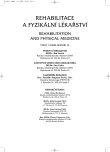-
Medical journals
- Career
Active Life Style and its Changes in Patients with Chronic Low-Back Pain
Authors: F. Helcl
Authors‘ workplace: Katedra fyzioterapie, Fakulta tělesné výchovy a sportu UK, Praha vedoucí katedry doc. PaedDr. D. Pavlů, CSc.
Published in: Rehabil. fyz. Lék., 15, 2008, No. 1, pp. 27-31.
Category: Comprehensive Report
Overview
Active life style is negatively influenced by chronic low-back pain. In the article differential diagnosis is shortly presented as well as comparison of outcomes of surgical and conservative therapies of herniated lumbar intervertebral discs. There is well known discre-pancy of clinical findings, graphic examinations, subjective complaints, length of work incapacity and return to work.
Particular attention is devoted to problems of return to work. It has been demonstrated that this parameter is much more influenced by psychological, economical and social factors than by medical ones.Key words:
active life style, chronic low-back pain, herniation of lumbar intervertebral disc, comparing of surgical and conservative treatments, return to work
Sources
1. ASSENDELFT, W. J. J., MORTON, S. C., YU, E. I., SUTTORP, M. J., SHEKELLE, P. G.: Spinal manipulative therapy for low back pain. A meta-analysis of effectiveness relative to other therapies. Ann Intern Med, 138, 2003, 11, pp. 871-881.
2. ATLAS, S. J., KELLER, R. B., CHANG, Y., DEYO, R. A., SINGER, D. E.: Surgical and nonsurgical management of sciatica secondary to a lumbar disc herniation: five-year outcomes from the Maine Lumbar Spine Study. Spine, 26, 2001, 10, pp. 1179-1187.
3. ATLAS, S. J., KELLER, R. B., WU, Y. A., DEYO, R. A., SINGER, D. E.: Long-term outcomes of surgical and nonsurgical management of sciatica secondary to a lumbar disc herniation: 10 year results from the Maine Lumbar Spine Study. Spine, 30, 2005, 8, pp. 927-935.
4. BEDNAŘÍK, J., KADAŇKA, Z.: Vertebrogenní neurologické syndromy. Praha, Triton, 2000, s. 122, 127, 129-132, 154-156.
5. CAMMISA, F. P. Jr., GIRARDI, F. P., SANGANI, P. K., PARVATANENI, H. K., CADAG, S., SANDHU, H. S.: Incidental durotomy in spine surgery. Spine, 25, 2000, 20, pp. 2663-2667.
6. DONCEEL, P., DU BOIS, M.: Fitness for work after surgery for lumbar disc herniation: a retrospective study. Eur Spine J, 7, 1998, 1, pp. 29-35.
7. KALA, M., BUŘVAL, S.: Spontánní resorpce výhřezu bederní meziobratlové ploténky. Prakt. Lék, 76, 1996, 10, s. 496-498.
8. KASÍK, J.: Vertebrogenní kořenové syndromy: diagnostika a léčba, Praha, Grada, 2002.
9. KATAYAMA, Y., MATSUYAMA, Y., YOSHIHARA, H., SAKAI, Y., NAKAMURA, H., NAKASHIMA, S., ITO, Z., ISHIGURO, N.: Comparison of surgical outcomes between macro discectomy and micro discectomy for lumbar disc herniation: a prospective randomized study with surgery performed by the same spine surgeon. J Spinal Disord Tech, 19, 2006, 5, pp. 344-347.
10. LOUPASIS, G. A., STAMOS, K., KATONIS, P. G., SAPKAS, G., KORRES, D. S., HARTOFILAKIDIS, G.: Seven - to 20-year outcome of lumbar discectomy. Spine, 24, 1999, 22, pp. 2313-2317.
11. NG, L. C., SELL, P.: Predictive value of the duration of sciatica for lumbar discectomy. A prospective cohort study. J. Bone Joint Surg. Br., 86, 2004, 4, pp. 546-549.
12. Nygaard, O. P., ROMNER, B., TRUMPY, J. H.: Duration of symptoms as a predictor of outcome after lumbar disc surgery. Acta Neurochir (Wien), 128, 1994, 1-4, pp. 53-56.
13. OSTELO, R. W. J. G., DE VET, H. C. W., WADDELL, G., KERCKHOFFS, M. R., LEFFERS, P., VAN TULDER, M.: Rehabilitation following first-time lumbar disc surgery. A systematic review within the framework of the Cochrane Collaboration. Spine, 28, 2003, 3, pp. 209-218.
14. Saruhashi, Y., MORI, K., KATSUURA, A., TAKAHASHI, S., MATSUSUE, Y., HUKUDA, S.: Evaluation of standard nucleotomy for lumbar disc herniation using the Love method: results of follow-up studies after more than 10 years. Eur Spine J., 13, 2004, 7, pp. 626-630.
15. SAXLER, G., KRÄMER, J., BARDEN, B., KURT, A., PFÖRTNER, J., BERNSMANN, K.: The long-term clinical sequelae of incidental durotomy in lumbar disc surgery. Spine, 30, 2005, 20, pp. 2298-2302.
16. SCHADE, V., SEMMER, N., MAIN, CH. J., HORA, J., BOOS, N.: The impact of clinical, morphological, psychosocial and work-related factors on the outcome of lumbar discectomy. Pain, 80, 1999, 1-2, pp. 239-249.
17. SLAVIN, K. V., RAJA, A., THORNTON, J., WAGNER, F. C. Jr.: Spontaneous regression of a large lumbar disc herniation: report of an illustrative case. Surg Neurol, 56, 2001, 5, pp. 333-337.
18. ŠOUREK, K.: Chirurgie bederních meziobratlových plotének. Praha, Avicenum, 1984, s. 18-19, 175-184.
19. ŠULLA, I.: Charakter kompresie miechových koreňov a výsledok liečby diskogénneho syndrómu cauda aequina. Bratisl. Lek. Listy, 99, 1998, 11, s. 605-609.
20. YORIMITSU, E., CHIBA, K., TOYAMA, Y., HIRABAYASHI, K.: Long-term outcomes of standard discectomy for lumbar disc herniation. A follow-up study of more than 10 years. Spine, 26, 2001, 6, pp. 652-657.
Labels
Physiotherapist, university degree Rehabilitation Sports medicine
Article was published inRehabilitation & Physical Medicine

2008 Issue 1-
All articles in this issue
- Viscoelastic Properties of Fibrous Connective Tissue and Manual Treatment
- Vibration: Neurophysiological Aspects and Possibilities of Clinical Application
- Recognize of Motor Disorders in First Year Life - Sensitivity and Specificity of Position Reactions
- Motivation of Locomotor Activity – Results of a Study Performed in Fitness Center Visitors
- Active Life Style and its Changes in Patients with Chronic Low-Back Pain
- Rehabilitation & Physical Medicine
- Journal archive
- Current issue
- Online only
- About the journal
Most read in this issue- Viscoelastic Properties of Fibrous Connective Tissue and Manual Treatment
- Vibration: Neurophysiological Aspects and Possibilities of Clinical Application
- Active Life Style and its Changes in Patients with Chronic Low-Back Pain
- Recognize of Motor Disorders in First Year Life - Sensitivity and Specificity of Position Reactions
Login#ADS_BOTTOM_SCRIPTS#Forgotten passwordEnter the email address that you registered with. We will send you instructions on how to set a new password.
- Career

